What Is Keyword Analysis?
Keyword analysis is the process of evaluating and analyzing search terms in an effort to determine which keywords are ideal for an SEO campaign.
Factors typically used to assist with keyword analysis include monthly search volume, level of SERP competition, and conversion potential.
In other words, keyword analysis helps you choose the best keywords for your current SEO campaigns. Specifically, keywords that match your current goals.
For example, let’s say that you run an ecommerce site that sells organic tea. And your main goal with SEO right now is to drive traffic to your new blog.
And your list of potential keywords include:
green tea benefits thai tea recipe does chai tea have caffeine pine needle teaAnalyzing those keywords can help you figure out which keywords you should target first.
In this case, the keyword “does chai tea have caffeine” might be your best fit as it gets a decent number of monthly searches and isn’t super competitive.
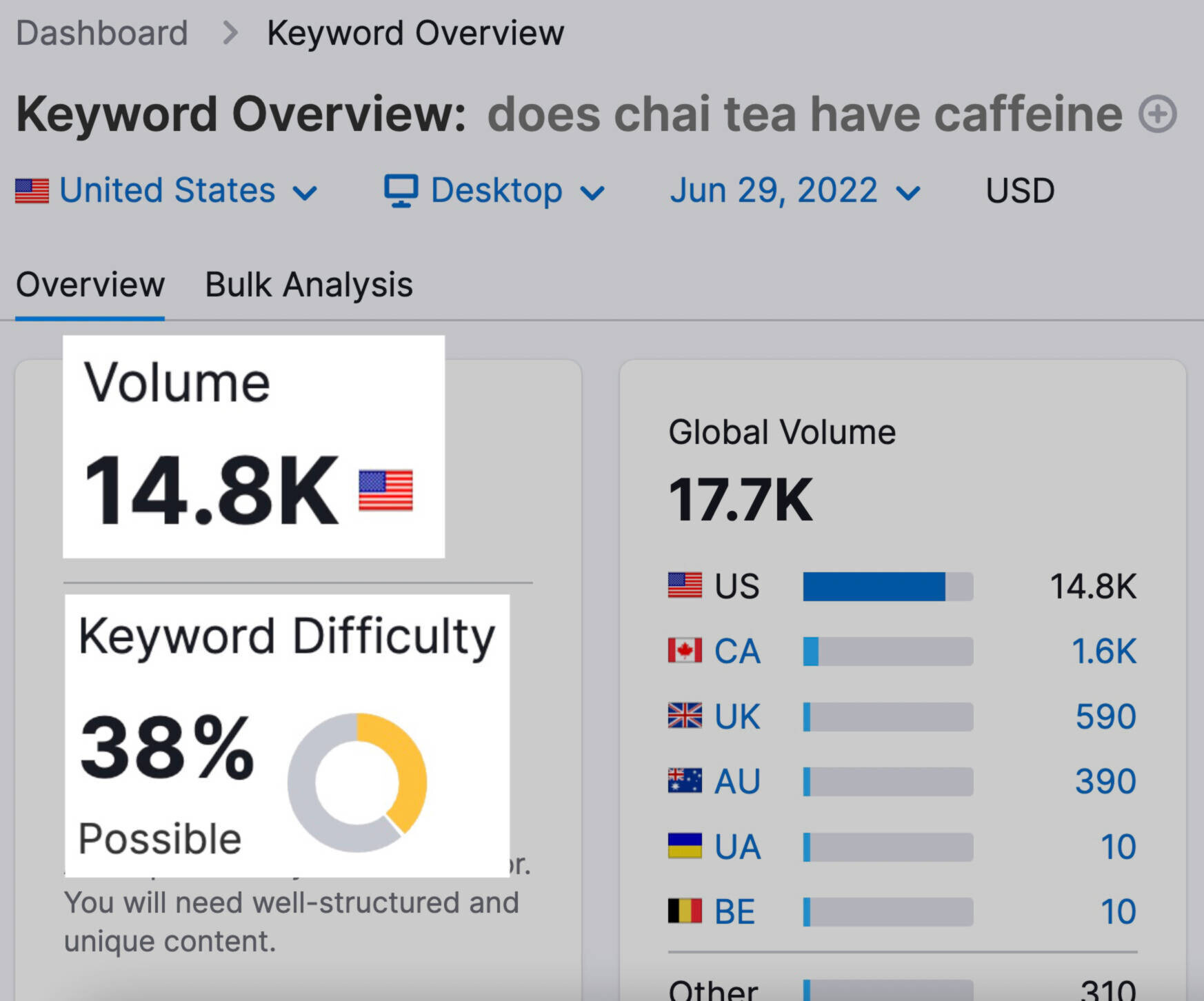
Why Is Keyword Analysis Important?
Finding a large number of potential keywords is relatively easy.
In fact, tools like the Semrush Keyword Magic Tool can generate literally thousands of keyword ideas in seconds:
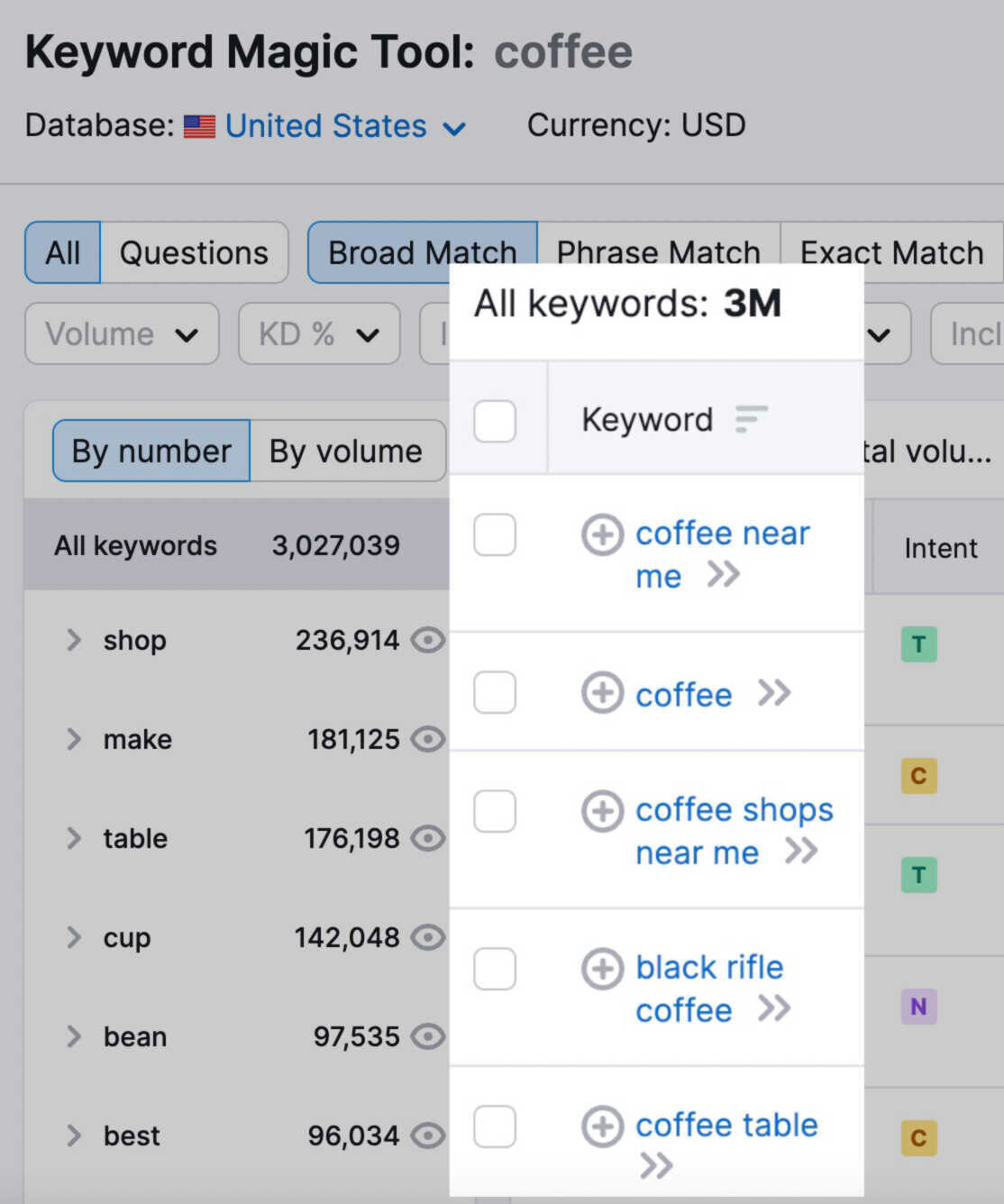
But how do you know which keywords on this list are right for you and your business?
Well, that’s where keyword analysis comes into play.
It’s a process to help you systematically identify keywords that are ideal for your specific SEO goals.
As you know, choosing the right keywords can make or break your SEO efforts. And a thorough keyword analysis will ensure that you’re choosing keywords that:
You have a decent chance of ranking for Will bring in targeted traffic Have a decent amount of monthly searches Will result in a positive ROIHow to Analyze Keywords For SEO
Now it’s time to get into the steps you can implement to find ideal SEO keywords for your business.
Step #1: Determine Keyword Difficulty
Your first step is to look at the keyword difficulty of the keywords that you’re analyzing.
Why look at keyword difficulty first?
Well, considering we’re trying to choose keywords for SEO, it’s critical that you can actually rank for a given term.
In other words: it doesn’t matter if the keyword has sky-high search volume and is made up of 100% buyers. If the keyword is too competitive for you to have a chance to rank for, it’s probably not worth targeting.
Most keyword research tools will show you an estimate of how competitive a keyword is to rank for (largely based on the competition of the first page of Google).
In Semrush, keyword difficulty is represented by “KD%."
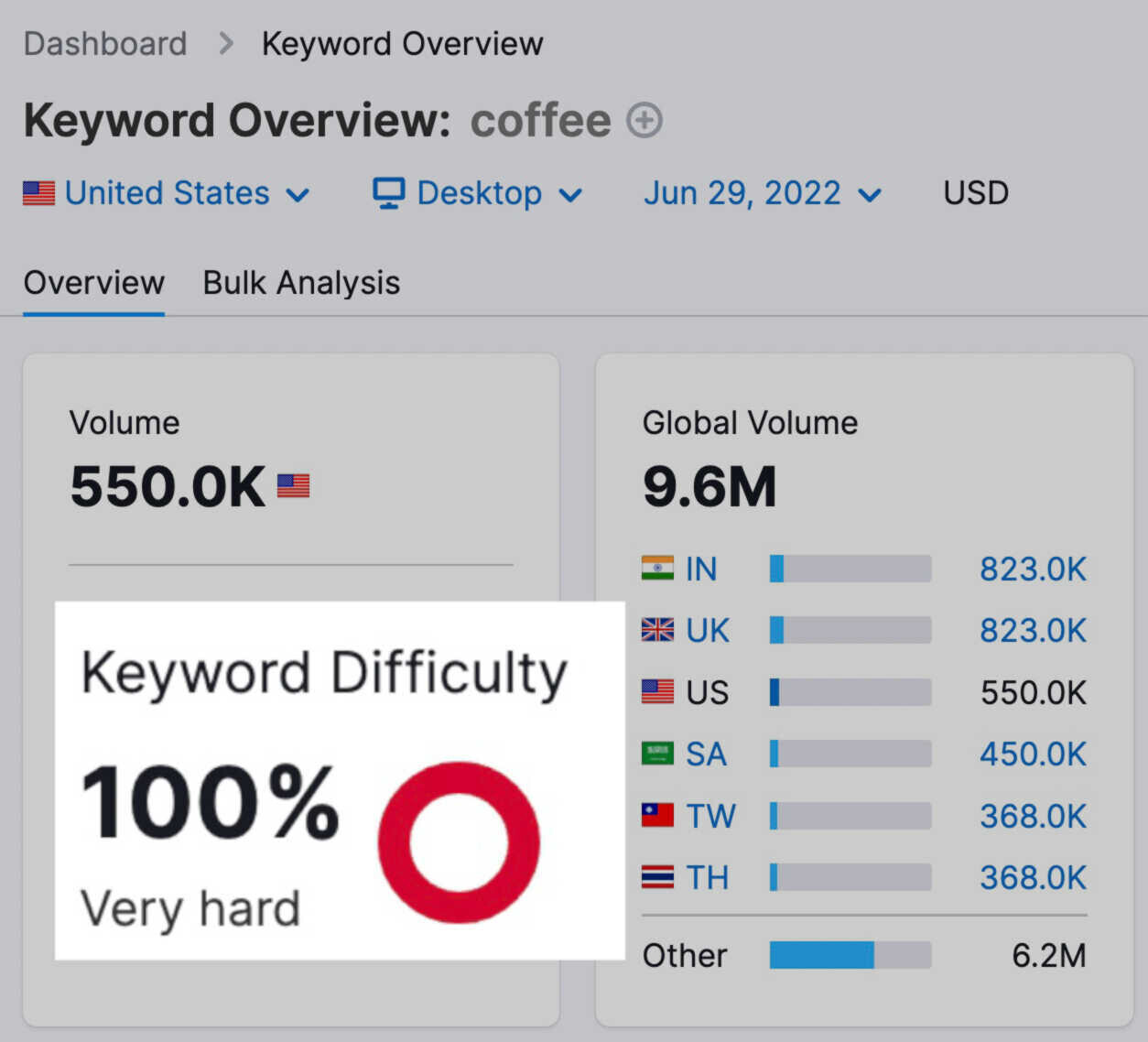
KD% is on a 1-100 scale. The higher this number, the harder it will be to rank for on the first page of Google.
For example, take a look at the keyword “keyword research presentation:”
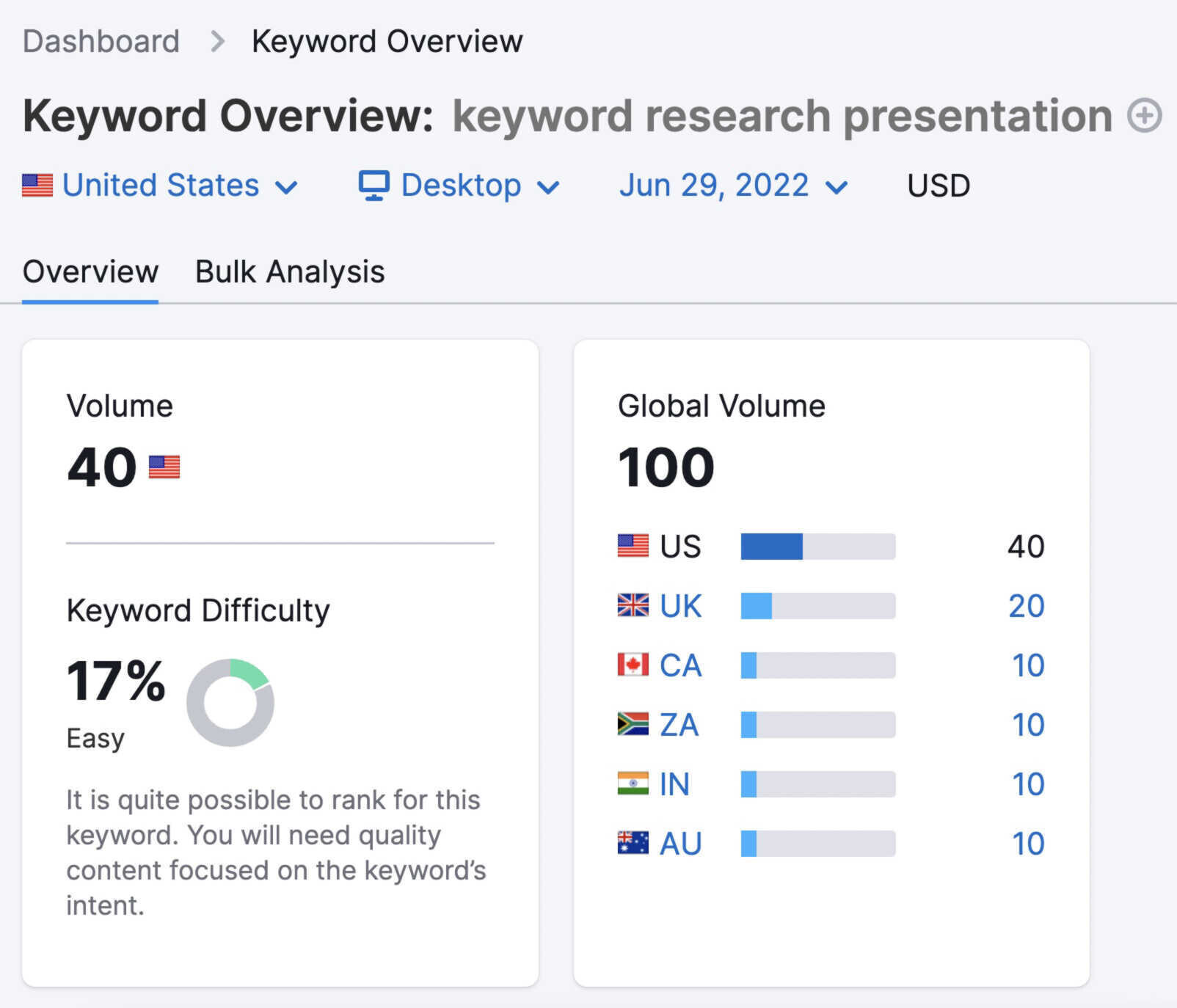
That keyword has a KD% of only 17%:
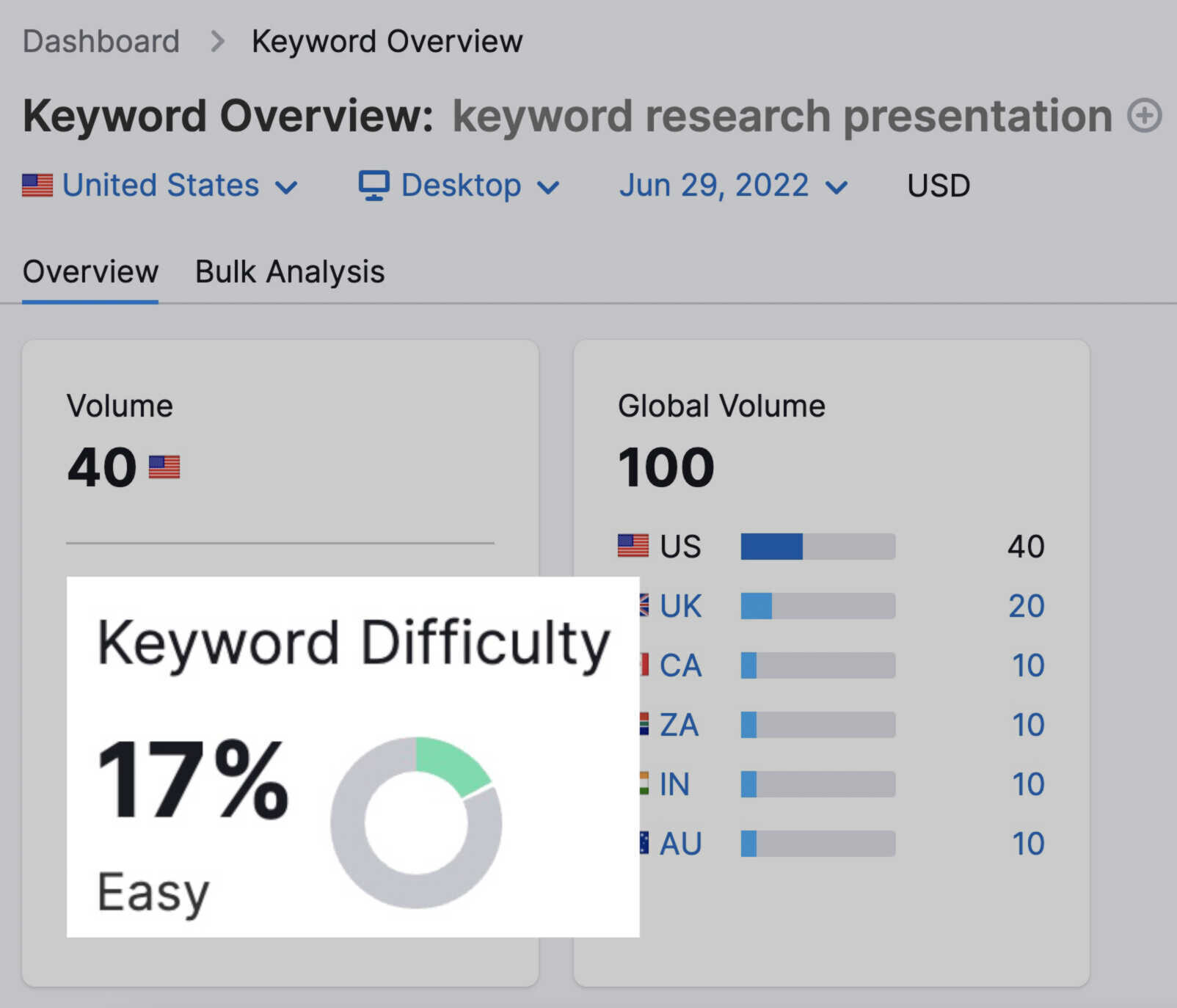
That suggests that this term should be pretty easy to rank for.
On the other hand, “keyword research” has a KD% of 100%:
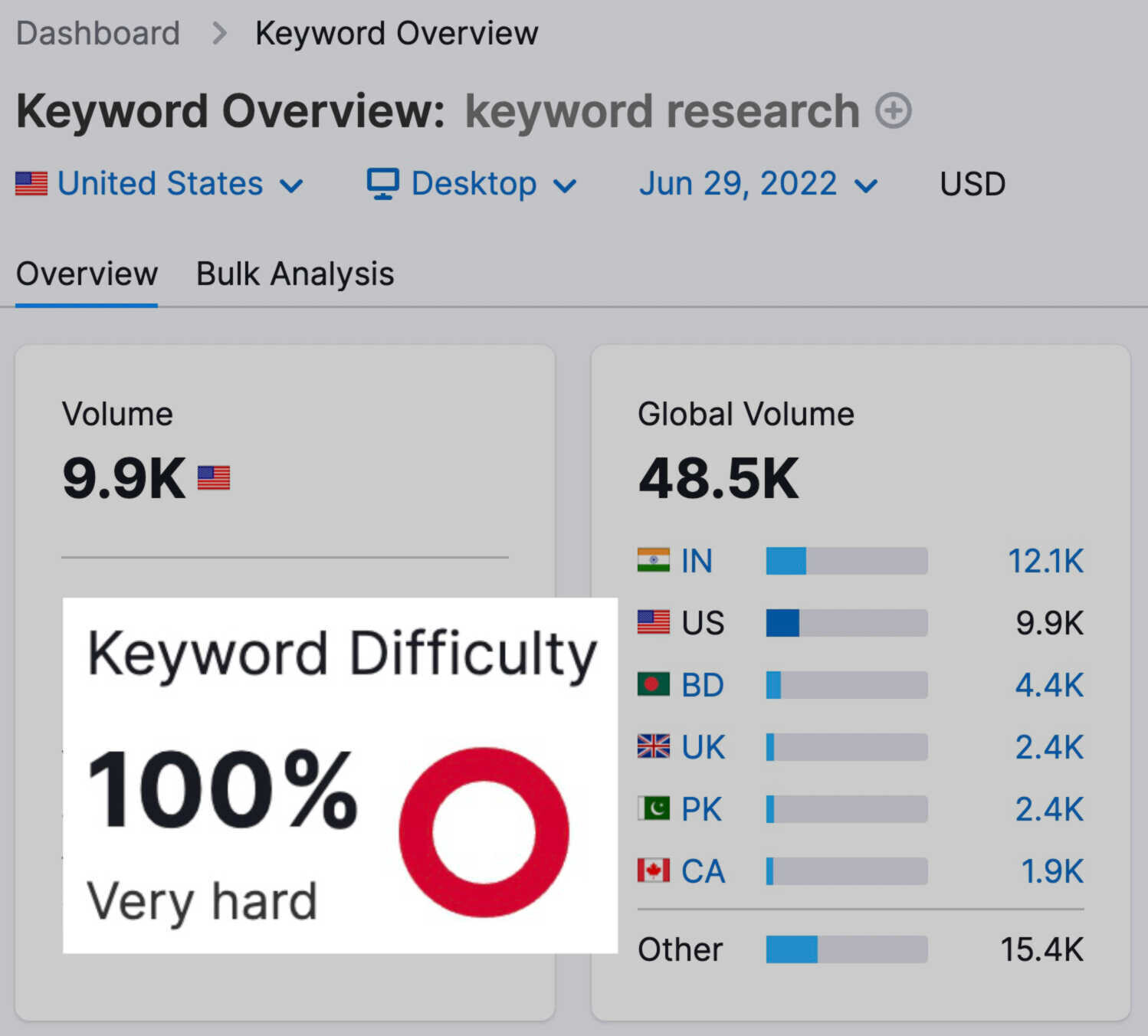
A KD% like that suggests that this keyword is far too competitive for most websites.
And even if your site is somewhat established, it would still take lots of resources and time to crack the first page.
Note: KD% is just an estimate of how competitive a keyword is. It’s possible that certain keywords will be easier or harder to rank for than the KD% indicates.
The question is: what’s the maximum “KD%” you should be aiming for?
It depends mainly on your website’s overall authority. In other words, if your site is an older established site with lots of backlinks, then you can target terms with relatively high competition.
But if your site is fairly new with few backlinks, you’ll definitely want to focus almost 100% on low competition terms at first.
You can quickly check your site’s SEO authority in Semrush.
Just pop your domain into the tool and you’ll get an “Authority Score."
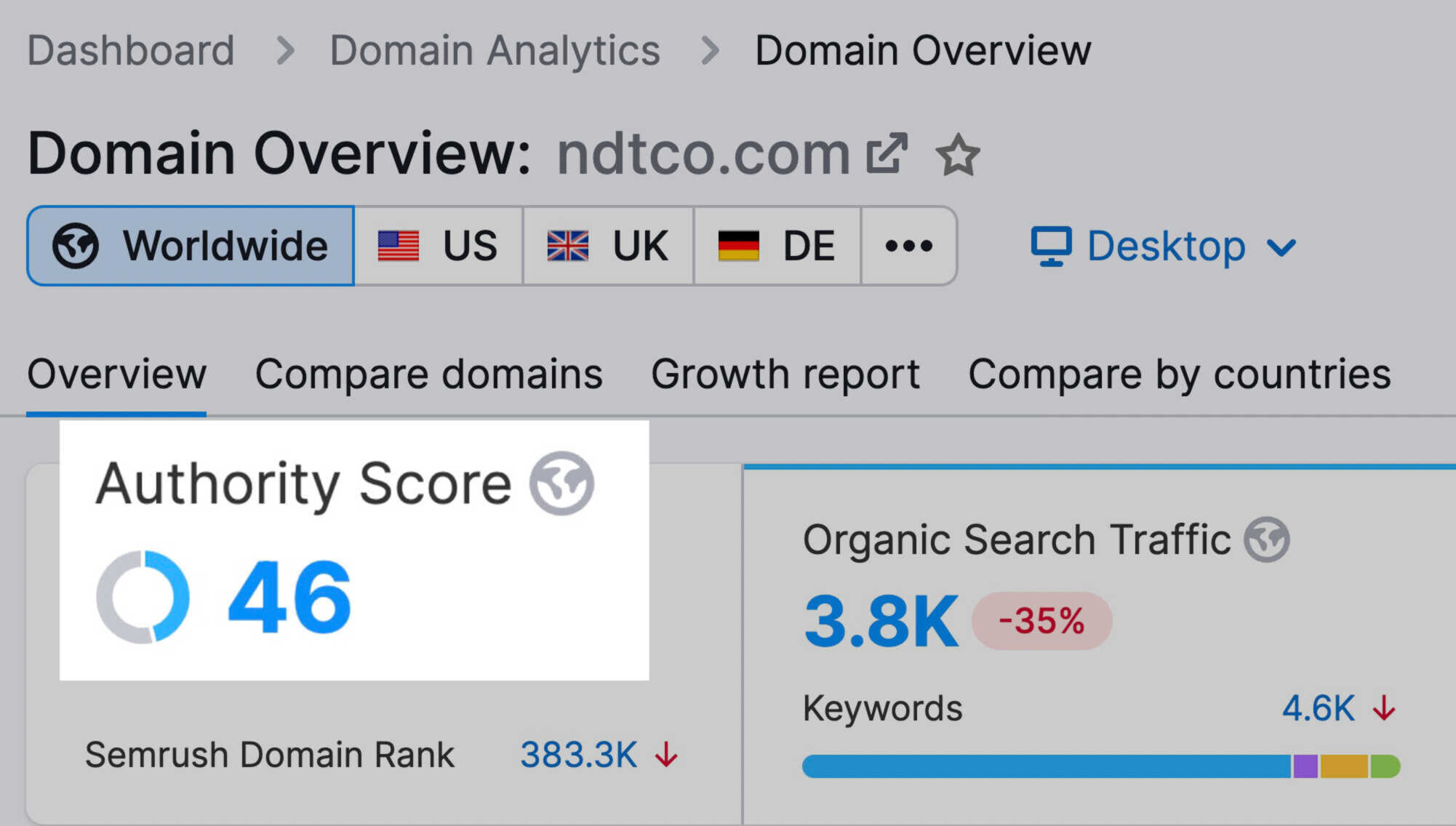
The higher your Authority Score, the higher chances you have of actually ranking for a highly competitive search term.
Plus, KD% is just one part of keyword analysis to consider. In other words, you don’t want to choose keywords based on their level of competition alone.
That’s because there are several other key factors to take into account when analyzing keywords for SEO. Let’s cover one of them right now.
Step #2: Estimate Profitability
Next, it’s time to figure out whether or not the people searching for these keywords are likely to convert down the road.
Estimating the exact ROI that you can expect from a ranking is really hard to do. However, you can estimate whether or not the keyword has the potential to bring in leads and customers.
For example, let’s say that you run an agency that develops mobile apps.
A keyword like “app development” is the exact type of keyword that your ideal customer is searching for.
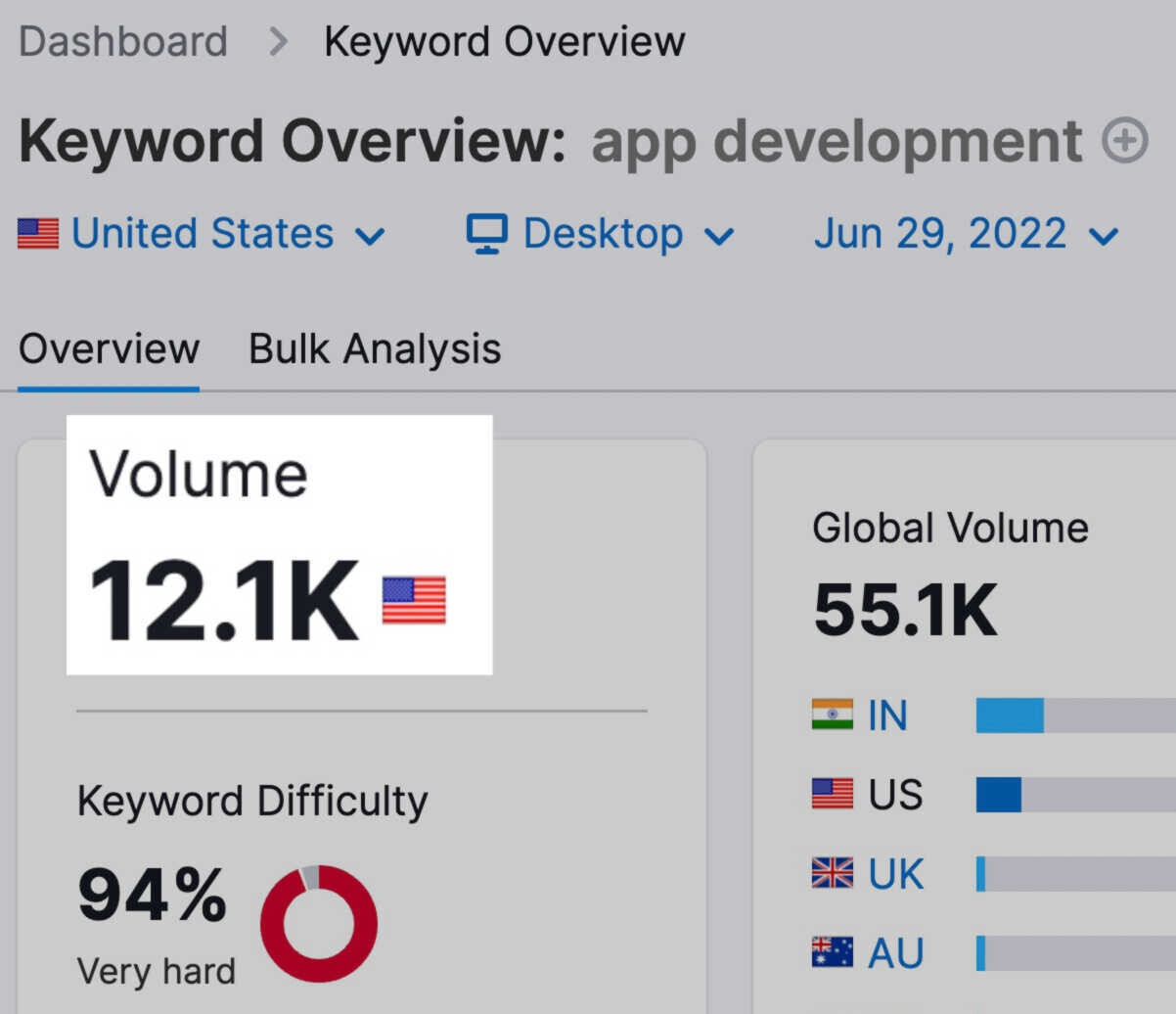
If you’re not sure about the profitability of a keyword, it can help to look at that keyword’s cost per click (CPC).
CPC indicates how much Google advertisers are spending to bid on that term.
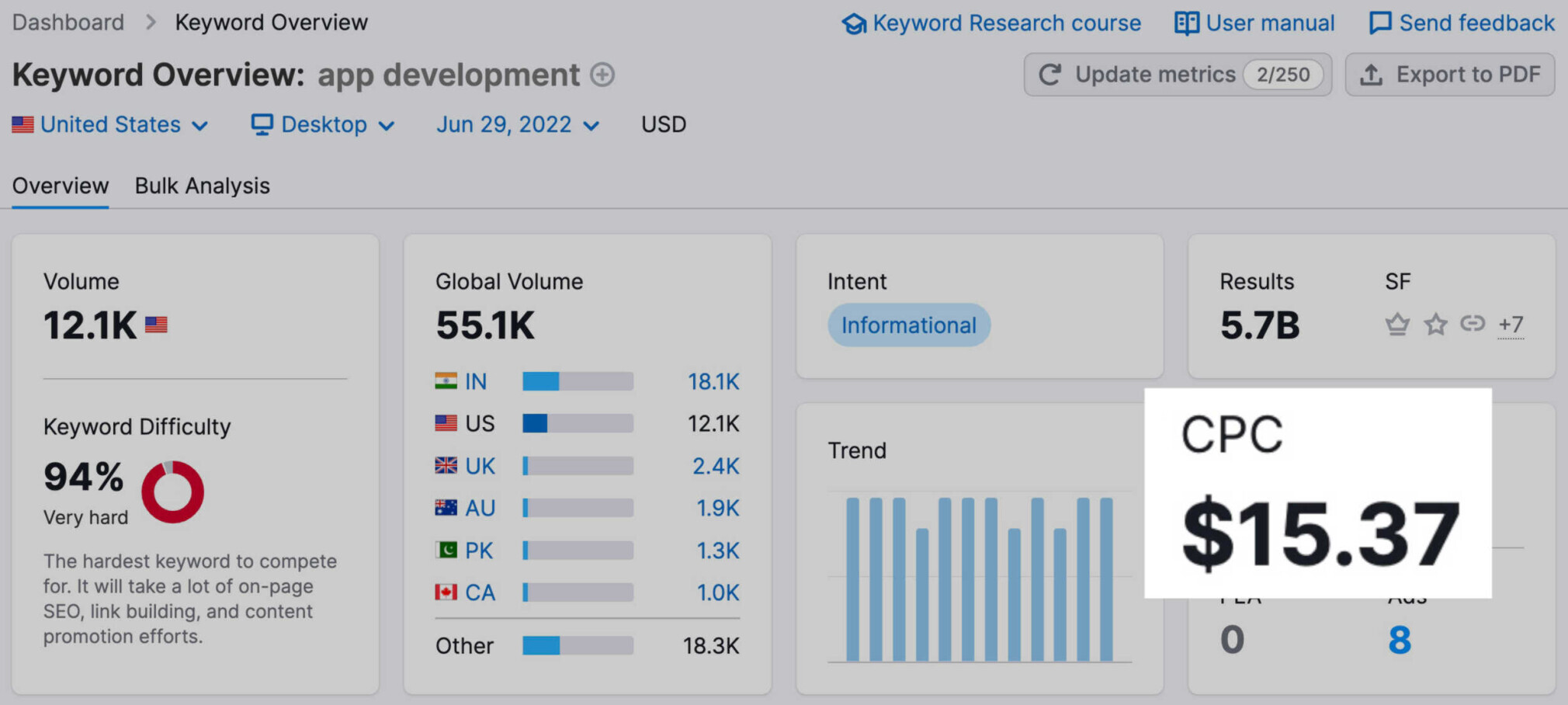
The higher the CPC, the more likely it is that these visitors will convert. After all, advertisers wouldn’t be bidding on those keywords if they didn’t convert!
Important note: You don’t need to target only “buy now” terms. It’s also helpful to create blog content around informational keywords that customers search for.
For example, take a keyword like “app development process."
Someone searching for “app development process” isn’t looking to hire someone at the moment. But that person is likely the target audience of an agency that helps create mobile apps for clients.
Which is why it can make business sense to get in front of this prospect now. That way, when they are ready to buy, your business will be top of mind.
These informational keywords may not have super high CPC. And the people searching for them may not convert right away. But they’re still worth including as part of your overall SEO strategy.
Step #3: Look at Search Volume
Monthly search volume is another important factor to keep in mind when analyzing a set of keywords.
Again, monthly search volume is a metric that’s easy to find in many tools (including Semrush).
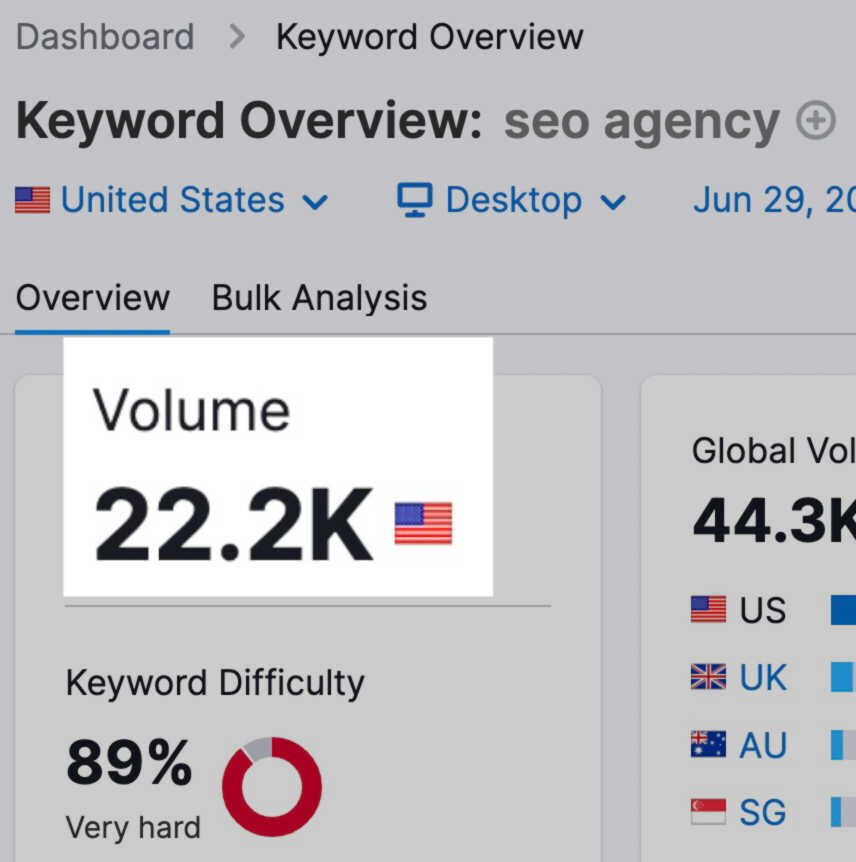
Needless to say, keywords with higher monthly search volumes are (usually) best for the simple reason that more searches=more potential traffic to your website when you rank for that keyword.
That said, sometimes people tend to focus too much on monthly search volume.
The issue with focusing too much on search volume is that high-volume terms can bring in lots of traffic. But not necessarily buyer traffic.
For example, take a keyword like this:
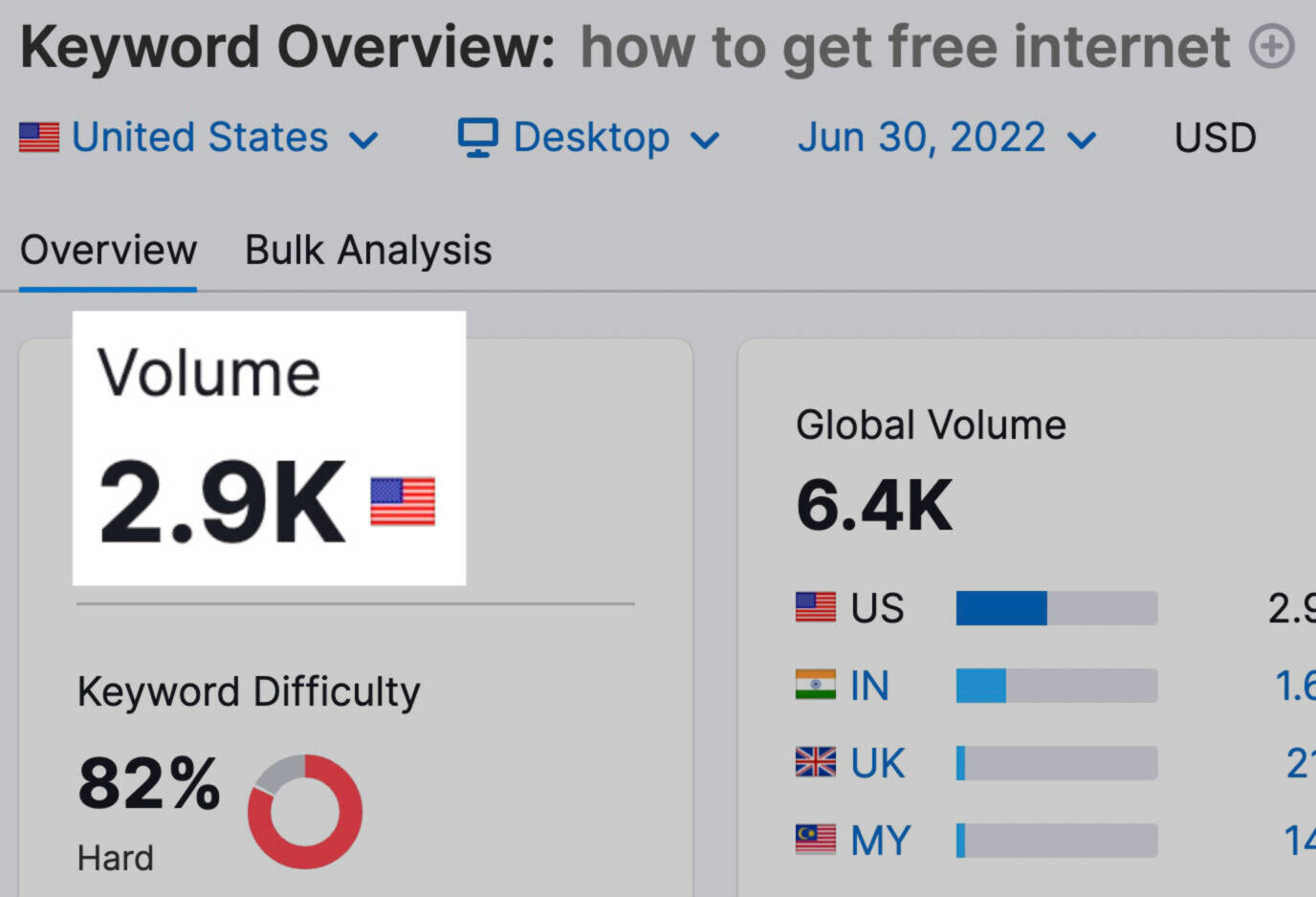
That keyword gets 2,900 searches each month. But it’s unlikely any of those people will become customers down the road.
On the other hand, check out this keyword:
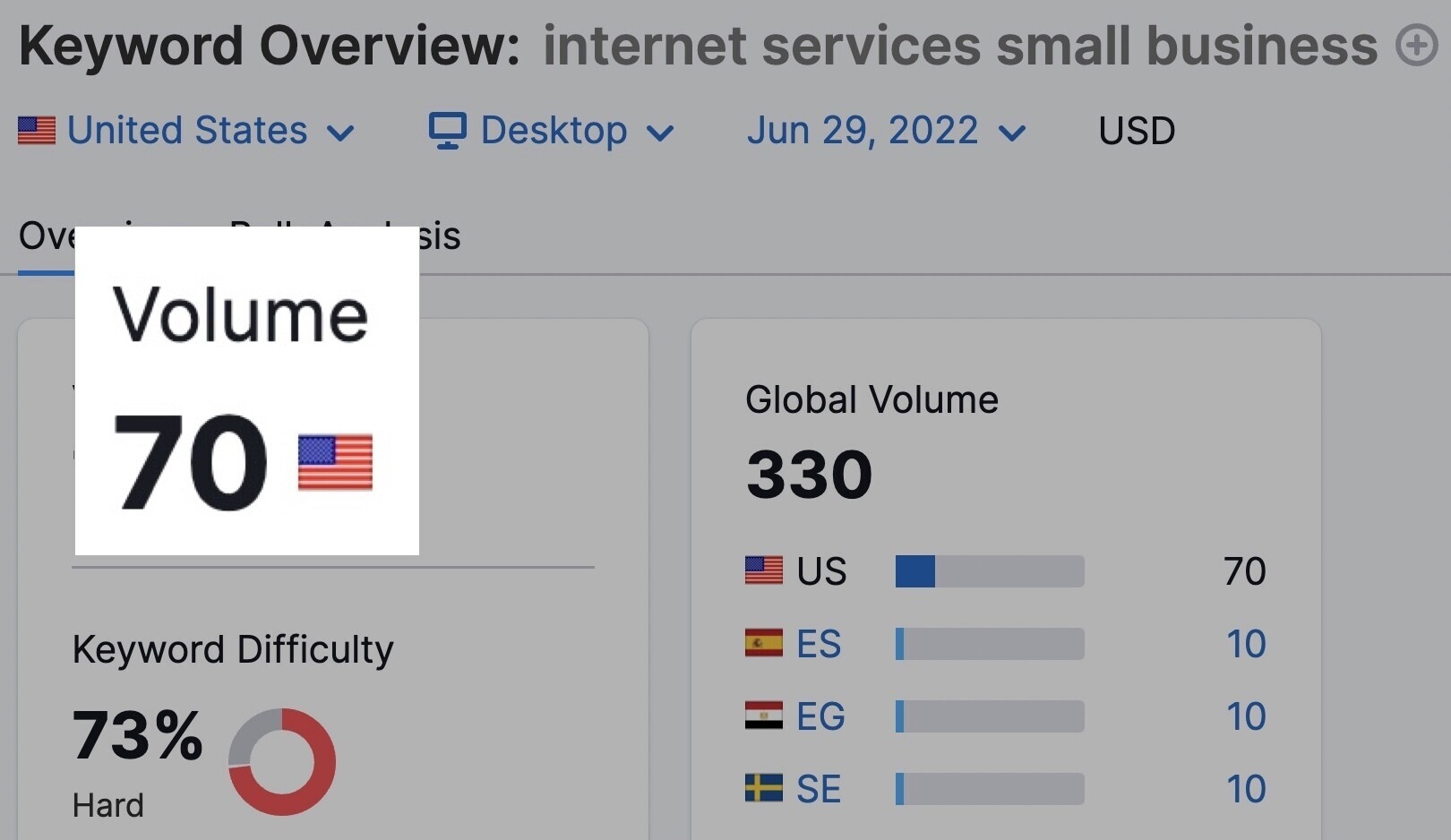
This keyword only gets 70 searches every month. But it’s likely that most of the people searching for that term are in “buy now” mode.
Also, monthly search volume is just an estimate. Sure, thanks to a recent update, Semrush’s search volume estimates are the most accurate in the industry.
But they’re still only estimates. Which is why you don’t want to worry too much about comparing a keyword with 800 searches per month vs. one with 900 searches per month.
In short, search volume should be part of your keyword analysis. But it’s not nearly as important as keyword difficulty or commercial intent.
Step #4: Note the Trend
Lastly, it can make sense to see how searches for a given keyword have been trending over time.
Why is this important?
Ranking for most keywords requires a significant amount of effort: outlining content, writing, publishing, on-page SEO, link building, and more.
Which is why it’s important to know how searches for that keyword are trending over time.
Otherwise, you could work hard to rank for a keyword. Only to see searches for that term dwindle.
For example, check out this keyword:
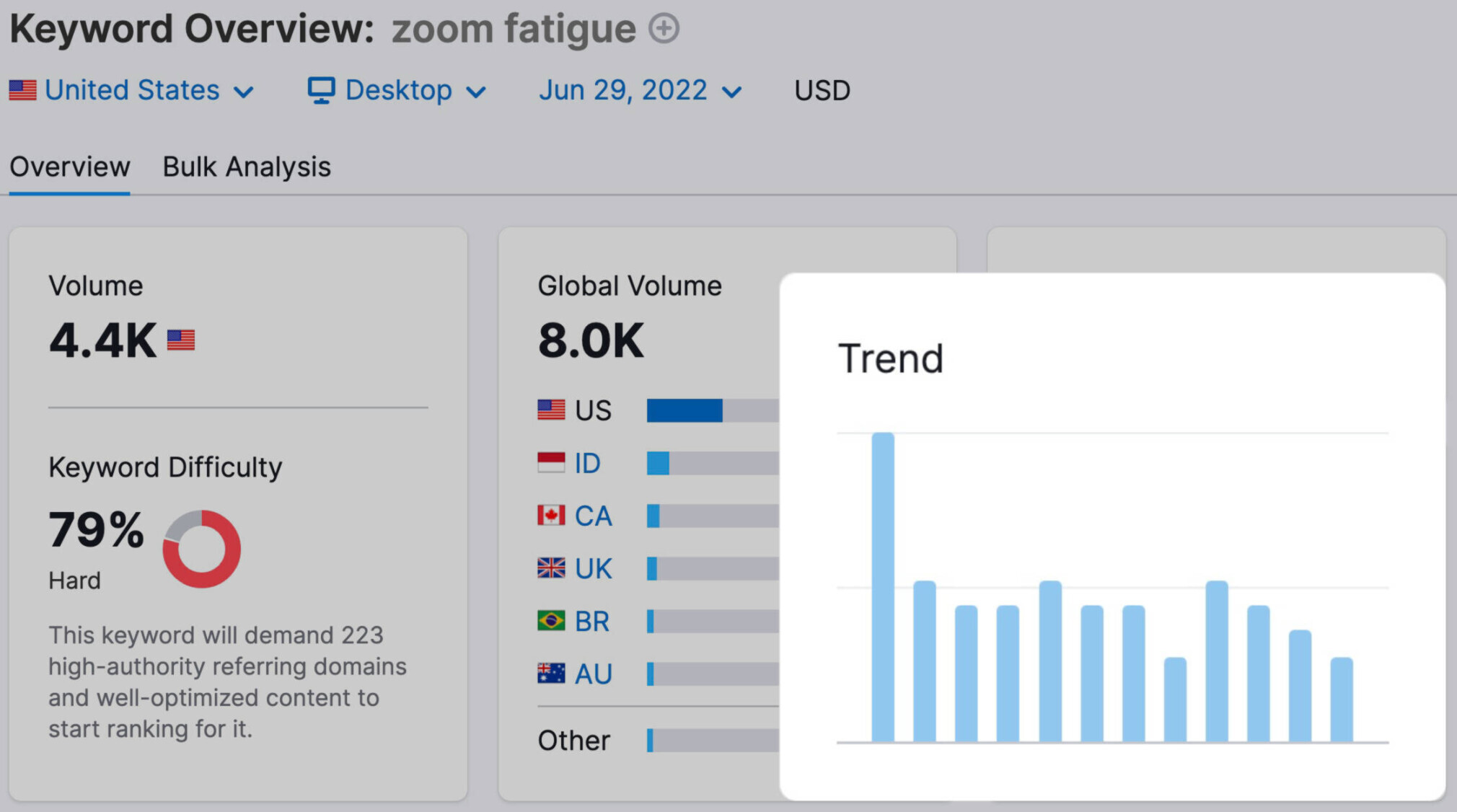
See how searches are steadily declining over time? That’s important intel to know before trying to rank for that term.
The opposite is also true: ranking for a keyword that’s trending up means that you can actually get more traffic over time.
Here’s an example:
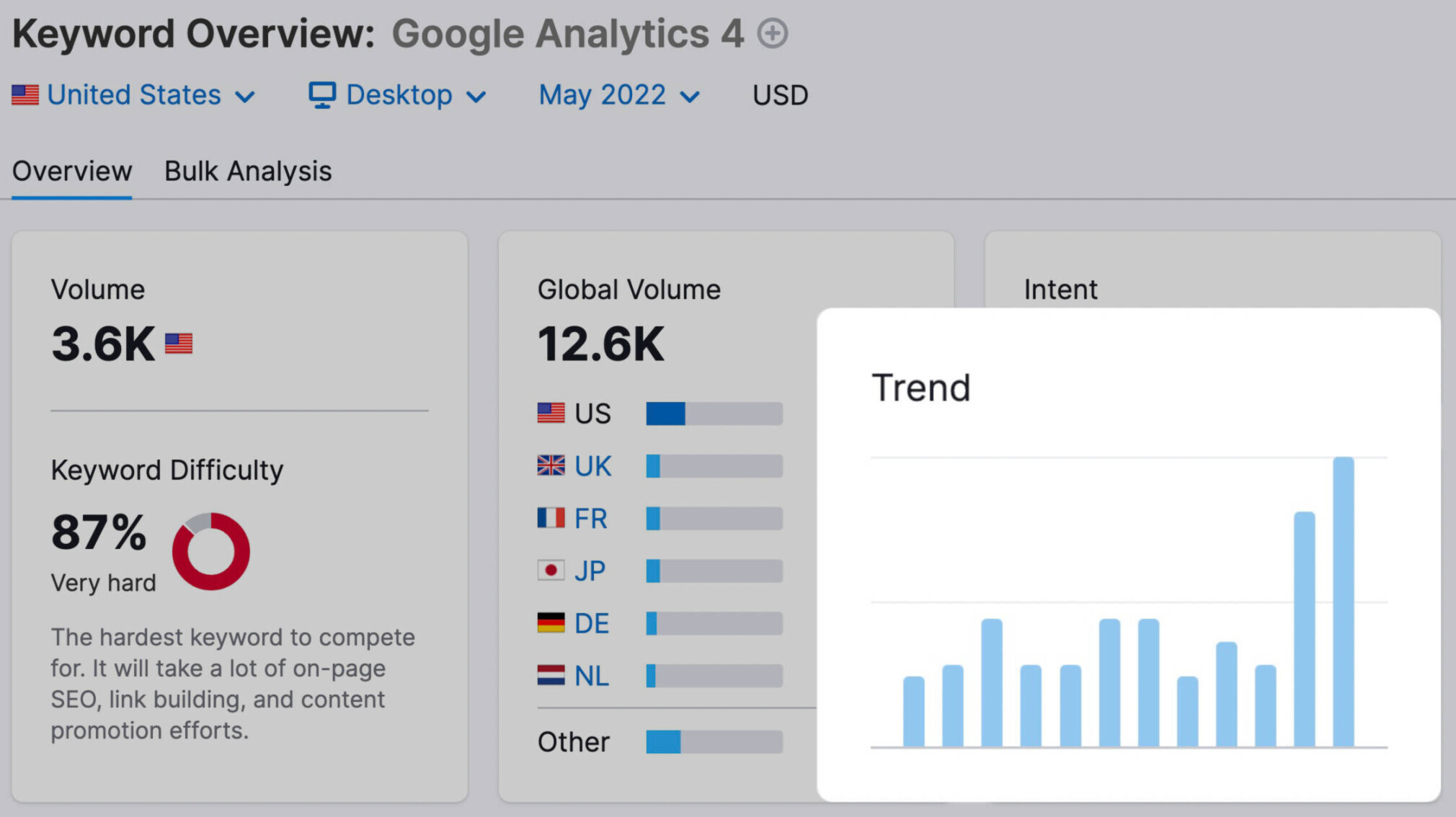
It usually doesn’t make sense to choose keywords solely based on whether they’re trending or not. But it is something to consider.
A Final Word on Keyword Analysis
To summarize, the four key factors that go into evaluating keywords are:
Keyword difficulty Profitability Search volume Trend statusThere’s no scientific formula that takes these four factors into account and lets you know: “this is the perfect keyword to target.”
That’s because there’s always a balance between these four factors. And it takes a human brain to determine which factors are most important for you.
For example, if your site is relatively new, then you probably want to make keyword difficulty a fairly important variable. But if your site has a ton of authority, then you don’t have to worry as much about keyword difficulty. So you can focus more on profitability.
In short: keyword analysis is important. But it’s definitely more of an art than an exact science. The process shouldn’t take so much time that it stops you from actually writing and publishing content.
Analyze Keywords with Semrush
Keyword research is essential for ensuring that your SEO campaigns are a success.
But you can’t do that keyword research all on your own.
That’s where Semrush can help. We’ve got the largest keyword database in the world. And a host of other best-in-class features to help make keyword analysis easier. Which means you’ll feel confident that the content you create will ultimately rank.
Innovative SEO services
SEO is a patience game; no secret there. We`ll work with you to develop a Search strategy focused on producing increased traffic rankings in as early as 3-months.
A proven Allinclusive. SEO services for measuring, executing, and optimizing for Search Engine success. We say what we do and do what we say.
Our company as Semrush Agency Partner has designed a search engine optimization service that is both ethical and result-driven. We use the latest tools, strategies, and trends to help you move up in the search engines for the right keywords to get noticed by the right audience.
Today, you can schedule a Discovery call with us about your company needs.
Source:





![How to Find Low-Competition Keywords with Semrush [Super Easy]](https://new.allinclusive.agency/uploads/images/how-to-find-low-competition-keywords-with-semrush-super-easy.svg)